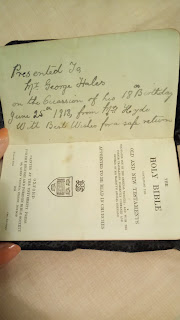Poetry books are in abundance on my book shelves and bedside table. I love poetry. I love words, artistically shaped into meaningful phrases. I wish I had the talent to do it better and I keep trying, but I think I peaked some time ago. My head is packed with stress and nonsense which I hope will eventually spill out and evaporate, giving me back some clarity and concentration, and something to write about.
As for choosing or having a favourite poet, for me, it’s like music and depends how I feel. They all have a place.
I suppose we all start as children, learning nursery rhymes and progress into poetry from there. My first poetry book must have been A Children’s Garden of Verse by Walter de la Mare. It’s a slim, hardback, well-used and dog-eared, still knocking around my house somewhere amongst my saved children’s books. I enjoy sharing books with the children at school. I often choose something that tells the story in rhyme, like Dr Seuss and ask the class if anyone can guess what word is next. I like to make it fun. I’ve borrowed a poetry book for children by Michael Rosen which my elder grandson enjoyed. I recently introduced him to my poem about Blackpool Tower, written a few years ago. He was arguing about when it was built, how long it took and I couldn’t convince him that it was less than a hundred years, so out came the book with the poem in it. I read the poem out aloud, not letting on that I’d written it until the end, when I showed him the name. Now he knows that I’m a published poet, I might have gone up in his estimation. I’m not just Nanna, who makes delicious muffins.
When I was a child, we had to learn poems or verses off by heart. It was part of English and usually set as homework to recite to the class. No escape. Here’s a favourite,
From Home-thoughts From Abroad by Robert Browning.
Oh, to be in England
Now that April’s there,
And whoever wakes in England
Sees, some morning, unaware,
That the lowest boughs and the brushwood sheaf
Round the elm tree bole are in tiny leaf,
While the chaffinch sings on the orchard bough
In England – now!
Later it was Shakespeare’s sonnets and Chaucer’s Wife of Bath from the Canterbury Tales.
My fondness for Dumfries & Galloway began with a visit to the birthplace of Robert Burns when we were on holiday near Ayr. Our first stay in the area was never going to be enough and over the years we may have traced his steps from Alloway to Ecclefechan and back again many times, visiting his various homes and his resting place in Dumfries. I wrote this some time ago,
You captured my heart with your words of romance,
I would have embraced you, if given the chance.
We might have been lovers and perfect soul mates,
What a shame I was born two centuries late.
John Betjeman, Simon Armitage, Maya Angelou and Lemn Sissay are all dear to me. How wonderful to see the work of Lemn Sissay displayed as artwork on the side of a Huddersfield University wall, and another in Manchester. We haven’t met, but I feel like I know him through his life story and his daily quatrains, and I want to hug him and say, “Look, at that! Look how far you’ve come!”
I have met Manchester poet, Mike Garry. His poetry still takes my breath away and I’ve seen him many times. The first time was 2012 at the Brewery Arts Centre in Kendal when he was on with John Cooper Clarke. Mike Garry, totally different to JCC, with an equal talent that blew me away. Read him, go and see him, listen to him on YouTube.
Dr John Cooper Clarke, he’s gone from strength to strength. Punk poet in the 1970s to GCSE and A-Level Curriculum inclusion now. Clever, witty and great in concert, with all his handwritten poetry on loose sheets of paper. That’s how it was in Kendal. I wonder if he ever got my Terza Rima?
When Manchester became Mad-chester.
Those of the time embraced every word,
Listening in wonder to John Cooper Clarke,
The Bard of Salford who had to be heard.
Rapid from the mouth and skinny and dark,
‘Evidently Chickentown’, effing good,
He’s magic with words, bright as any spark.
His wholesome description meant that we could
Smell the inhabitants of ‘Beezley Street’,
Rich mixture of urban decay and blood.
Life, humour and truth, a picture complete
And painted with colourful language that
Reaches all listeners not just the elite.
So thanks, JCC, I know where I’m at,
Laughing out loud at the poem called ‘Twat’.
PMW 2012
I haven’t got a definite favourite. I’ve missed lots out and there are people I know through open-mic and similar formats who write some terrific poetry and make me want to snap all my pencils.
This is a long blog, but thanks for reading, Pam x




























